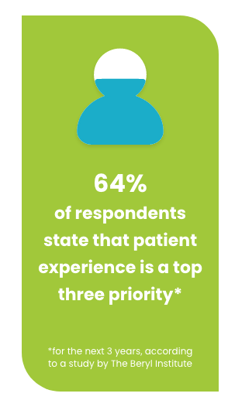“... All too often, the powerful simplicity of our humanness gets lost in the process of medicine itself.” — Excerpt from Connected: Improving the Patient-Physician Relationship — and Health Care Itself — Through Communication
It is well established that positive relationships between patients and providers drive better health outcomes. That’s why hospitals and healthcare organizations are devoting more and more resources to improving their patient experiences every year.
 The Beryl Institute describes itself as, “a global community of over 55,000 healthcare professionals and experience champions committed to transforming the human experience in healthcare.” In their annual report on the subject of patient experience, they found that healthcare organizations are prioritizing factors related to patient experience, such as addressing quality, security, and service. Their survey included respondents from 33 countries, 75% of which came from hospitals or hospital groups. 64% of these respondents considered patient experience one of their top three priorities for the next three years.
The Beryl Institute describes itself as, “a global community of over 55,000 healthcare professionals and experience champions committed to transforming the human experience in healthcare.” In their annual report on the subject of patient experience, they found that healthcare organizations are prioritizing factors related to patient experience, such as addressing quality, security, and service. Their survey included respondents from 33 countries, 75% of which came from hospitals or hospital groups. 64% of these respondents considered patient experience one of their top three priorities for the next three years.
- 2% of respondents said they had not yet begun their efforts to address patient experience
- 11% were only beginning to do so
- 54% were making progress or were established in their efforts
- 33% felt that their patient experience efforts were well-established and integrated
In their white paper, Connected, The Beryl Institute outlines several critical points that were identified by patients and providers as key to positive patient experiences, including:
- Generosity of time to discuss medical issues and concerns
- Collaboration as a partnership requiring honest dialogue
At Vera Whole Health, these same practices are integrated into the foundation of every patient-provider relationship.
 Generous time to discuss issues
Generous time to discuss issues
A study published in Medical Care found that primary care appointments typically average 18 minutes long. This typically leads to appointment overrun, longer patient wait times, less thorough conversations, and burnout for providers.
With Vera’s advanced primary care (APC) model, appointments average between 30 minutes to an hour. This increase in time allows patients and providers to develop meaningful relationships and discuss all aspects of a patient’s health. To make those conversations more impactful, providers, Vera whole health coaches, and medical staff are also trained in empathetic listening practices. The result is an experience where patients feel that they are truly heard.
Collaboration & partnership with dedicated care teams
The APC model ensures that patients partner with providers and Vera health coaches who form the core of dedicated care teams. With plenty of time during appointments, providers adequately educate and inform patients about their treatment options.
That information allows patients to assist in the creation of a personalized care plan that acknowledges their barriers to better health and goals. Vera health coaches offer support, helping patients take ownership of their healthcare journeys and meet their goals.
 The increasingly digital aspect of patient experience
The increasingly digital aspect of patient experience
But, that’s not all. The Beryl Institute’s survey also illuminated the growing importance of telehealth and connected digital strategies in providing meaningful patient experiences. The use of digital tactics is rising across the board and patients are beginning to expect easy access to these types of resources.
This is why we’ve combined our proven APC model with Castlight Health’s cutting-edge digital navigation technology. Together, we're making healthcare decisions easier by improving awareness and access, and we’re creating a more personalized experience. This approach uses data-driven insights to get people the care they need at the right place and time. By doing this, we can close even more gaps in care and empower patients to have greater confidence and control over their own health and wellbeing.
Vera is committed to the patient experience
“This unwavering commitment to the human experience in health care reinforces an idea we have long believed—that all voices matter. And to understand those voices, we must never be afraid to ask what matters to them.” — Excerpt from Connected
Vera’s non-hurried appointments, empathetic listening practices, dedicated care teams, and digital capabilities all contribute to impactful patient experiences. It’s important, not only because it’s the right thing to do, but because it’s effective.
Patients who are treated to Vera’s clinical experience are more likely to become engaged and take ownership of their health. That behavior change drives positive health outcomes. It also lowers costs for patients and employers, because healthier patients mean fewer claims and fewer expensive ER visits.
“It’s the accountability I think. It’s knowing someone else cares. I think that’s what the key is. I have somebody to share with. We set these little goals and then I know she’s going to ask about them. Because I am who I am, I want to make it happen. In turn, I’m stronger. I’m extremely strong not only physically but emotionally.” — Rosemary, Vera patient

Editor's Note: This is an updated version of the original post published on May 24, 2018.